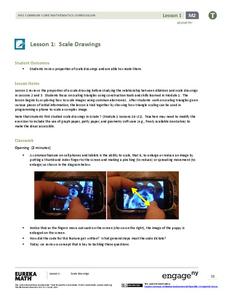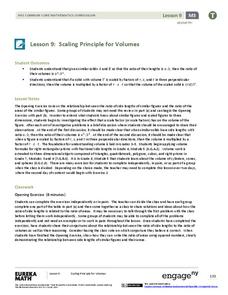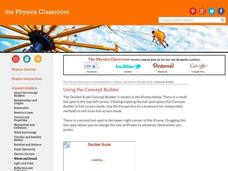Journey Through the Universe
The Voyage Scale Model Solar System
Young scientists learn how to select a scale factor for a large scale model. Then they figure the scale for each of the planets and the distance between them. Finally, they construct a giant scale model of the solar system and answer...
EngageNY
Scale Drawings
Are you searching for a purpose for geometric constructions? Use an engaging approach to explore dilations. Scholars create dilations using a construction method of their choice. As they build their constructed dilation, they...
EngageNY
Computing Actual Lengths from a Scale Drawing
The original drawing is eight units — how big is the scale drawing? Classmates determine the scale percent between a scale drawing and an object to calculate the length of a portion of the object. They use the percent equation to find...
EngageNY
Changing Scales
Pupils determine scale factors from one figure to another and the scale factor in the reverse direction. Scholars compute the percent changes between three figures.
EngageNY
Scaling Principle for Volumes
Review the principles of scaling areas and draws a comparison to scaling volumes with a third dimensional measurement. The exercises continue with what happens to the volume if the dimensions are not multiplied by the same...
Science Matters
Richter Scale
The 12th instructional activity in a series of 20 opens with a demonstration of exponential functions using pasta. This concept is connected to the Richter Scale, which is also an exponential function. Scholars compare the exponential...
EngageNY
Relating Scale Drawings to Ratios and Rates
Enlargements and reductions are all about scale. The lesson introduces scale drawing to the class. Pupils determine whether the drawing is a reduction or an enlargement, and the constant of proportionality between the original and the...
EngageNY
The Unit Rate as the Scale Factor
Discover the scale factor by finding the constant of proportionality. Pupils investigate drawings to determine whether the distances are proportional. The activity defines the scale factor as the constant of proportionality, or unit...
EngageNY
An Exercise in Changing Scales
Classmates create a scale drawing from another scale drawing, changing the scale in the process. Groups enlarge or reduce the scale of the drawing and discuss their processes.
EngageNY
Solving Area Problems Using Scale Drawings
Calculate the areas of scale drawings until a more efficient method emerges. Pupils find the relationship between the scale factor of a scale drawing and the scale of the areas. They determine the scale of the areas is the square of the...
EngageNY
Making Scale Drawings Using the Ratio Method
Is that drawn to scale? Capture the artistry of geometry using the ratio method to create dilations. Mathematicians use a center and ratio to create a scaled drawing. They then use a ruler and protractor to verify measurements.
EngageNY
Scale Factors
Is it bigger, or is it smaller—or maybe it's the same size? Individuals learn to describe enlargements and reductions and quantify the result. Lesson five in the series connects the creation of a dilated image to the result. Pupils...
National Council of Teachers of Mathematics
Scale Factor
Does doubling mean everything doubles? Learners adjust the scale factor between two rectangles. Using the calculated measurements, pupils investigate the ratios between the lengths, perimeters, and areas of the rectangles.
EngageNY
Computing Actual Areas from a Scale Drawing
Square the scale factor when working with scaled drawings and area. The 19th lesson in a series of 22 introduces calculating actual areas from scale drawings. The lesson encourages pupils to use the square of the scale factor to find the...
EngageNY
An Exercise in Changing Scales 2
Reflect on altering scale factors. The last lesson in the series of 22 has the class compare the two scale drawings they created. They realize that the scale drawing becomes a scale drawing of each other. Class members continue to work...
Physics Classroom
Decibel Scale
Turn it up! Sound scientists explore the decibel scale through an interactive that calculates movement up and down the scale. Part of a series of interactives that explore sounds and waves, the resource includes a help feature to support...
EngageNY
Computing Actual Lengths from a Scale Drawing
Class members take scale drawings and examine scales to determine distances in the actual objects. Pupils convert the scales of different units to scale factors that can be used in proportional equations.
Magic of Physics
Scale of the Universe I
From quantum foam to the universe itself, plus everything in between, what is the scale of the world around us? Inquisitive physicists grapple with the proportions of all things great and small using a fascinating interactive. Scholars...
Curated OER
Navajo Weaving: A Lesson in Math and Tradition
Combine geometry and tradition with a lesson that spotlights Navajo weaving. The book, The Goat in the Rug by Charles L. Blood and Martin Link hooks scholars before watching a video of Navajo people tending their sheep and beginning...
media.yurisnight.net
Science Lesson Plan: Our Solar System: I Wonder?
Ever wonder why Pluto isn't considered a planet? Or how large the Earth is compared to the other inner planets? Explore the universe with a series of projects that simulate different aspects of our solar system. The activities require...
EngageNY
The Scaling Principle for Area
As they investigate scaling figures and calculate the resulting areas, groups determine the area of similar figures. They continue to investigate the results when the vertical and horizontal scales are not equal.
National Research Center for Career and Technical Education
Photoshop Scale
Say cheese! Can your class take a great photo and size it to fit any need? A career and technology-centered lesson plan demonstrates the correct way to resize images in Adobe Photoshop. Scholars view a presentation and work individually...
EngageNY
The Scale Factor as a Percent for a Scale Drawing
Scholars build upon their knowledge of scale drawings by using percents to represent the scale factor. Individuals work with scaling in vertical, horizontal, and both directions.
Balanced Assessment
Scale Charts
Develop scales using tables. Pupils complete charts to show equivalent scale factors before using the completed tables to determine the sizes of scale drawings. They finish the lesson and demonstrate their understanding by completing a...























